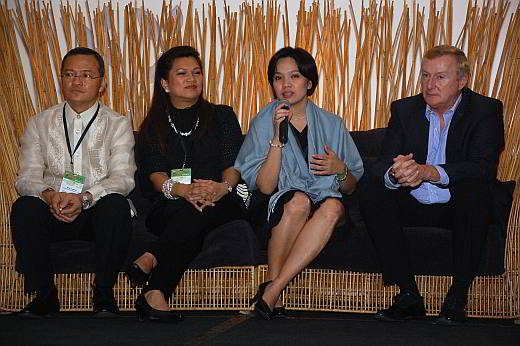
Guenter Taus, vice president of the European Chamber of Commerce of the Philippines (ECCP), (right) leads the speakers during yesterday’s Energy Smart Cebu 2014 Forum. With him are (from left) Noel Verdote, Sustainability and Climate Finance International Finance Corp. (IFC) operations officer; Jo Ann Eala, vice president of Bank of the Philippine Islands; Mariana Fernando Pacua, operations analyst of Sustainability and Climate Finance IFC. (CDN PHOTO/CHRISTIAN MANINGO)
The European Chamber of Commerce of the Philippines (ECCP) has given six recommendations to help prevent the expected looming energy shortage next year in the Luzon grid.
Guenter Taus, ECCP vice president, recommended the six short-term actions to help the country achieve sustainable and stable energy during his speech in yesterday’s Energy Smart Cebu 2014 Forum.
The forum held at the Radisson Blu Hotel is a one-day conference and exhibition organized by the ECCP to promote the advancement of solutions and initiatives on energy efficiency, renewable energy and clean technology.
“The power situation in the country today is critical and drastic steps have to be undertaken because available and stable power is critical for economic growth,” said Taus.
Taus added that the ECCP does not agree with the idea of giving President Benigno Aquino III emergency powers as the solution to the power problem.
“We are the only chamber in the country who have openly expressed our opposition to emergency powers. For us, we don’t think there is a need to go back to the ‘dark age,’ import power barges, and spend a fortune. We have enough reserve provided we do our part,” said Taus.
Luzon is expected next year to experience a shortage from 400 megawatts (MW) to 800 MW. To address this problem, the government plans to tap emergency power sources.
Taus said that the Luzon grid which supplies 12,500 MW is expected to experience a shortage of power supply because of the scheduled maintenance of some of its power plants this March.
The first recommendation is for everyone to implement and adopt energy conservation and energy efficiency measures.
Taus said everyone — individuals at home, companies, retail establishments, and government offices — can save 20 percent to 30 percent of energy, which can be used to further grow the economy.
“If the companies, malls, government offices and individual families in Luzon reduce the aircon’s thermostat to 25 degrees from the usual 22 degrees, they can easily save 10 percent or about 1,250 MW which can already cover for the 400 MW to 800 MW shortage. Thus, they can avoid having to go through the hour-long rotational brownouts,” said Taus.
LOAD SHARING
Another recommendation is for Luzon to introduce and implement a viable interruptible load sharing program (ILP). The ILP program has been proven in Cebu with the Visayan Electric Company (Veco) and its private partners successfully implementing the program.
Streamlining the approval process for new power generation projects is the ECCP’s third recommendation.
Taus said that in most countries, it only takes three years to build a power plant, but in the country it takes more than five years because of the tedious process which needs 162 different signatures from different environmental groups.
FIVE SIGNATURES
“We think there are only five needed signatures. It includes the Department of Environment and Natural Resources, the Department of Energy, the Energy Regulation Commission, the Board of Investments and the local government units. Honestly speaking, having 162 signatures is just ridiculous,” he said.
The ECCP also recommended the removal of the power price cap at the spot market, which is a disincentive to private investors to invest in more projects in the future.
“What we need to have is a more attractive electricity price that’s based on natural supply and demand law and not on price manipulation. That way, we can encourage more investments on greenfield and brownfield projects,” he said.
The last recommendation is for the government to fast-track the tender for Malampaya banked gas.
Taus said by 2016, Malampaya’s banked gas can power a 200 MW plant while the PNOC (Philippine National Oil Co.) also has banked gas of the same capacity.
“Why don’t the government use these banked gas to develop another 400 MW power plant?” Taus asked.
ccci backing
Ma Teresa Chan, Cebu Chamber of Commerce and Industry president, said they support ECCP’s recommendations.
Chan said the “The CCCI requests Congress to give authority to President Aquino to facilitate and fast-track the permit of putting up new base load power plants like coal-fired, geothermal and hydropower.
The CCCI also asked for a full implementation of the ILP in Metro Manila,” said Chan.
Prudencio Gesta, CCCI past president, said the government through the Department of Energy must look at the ECCP recommendations seriously.